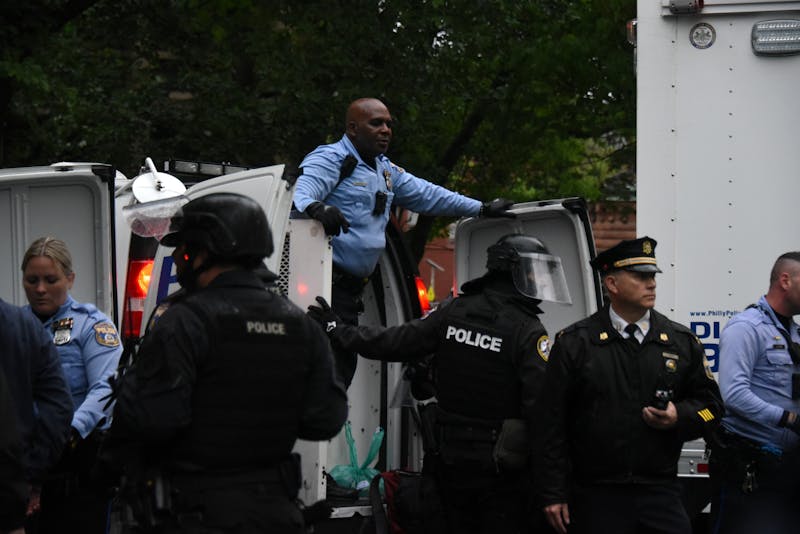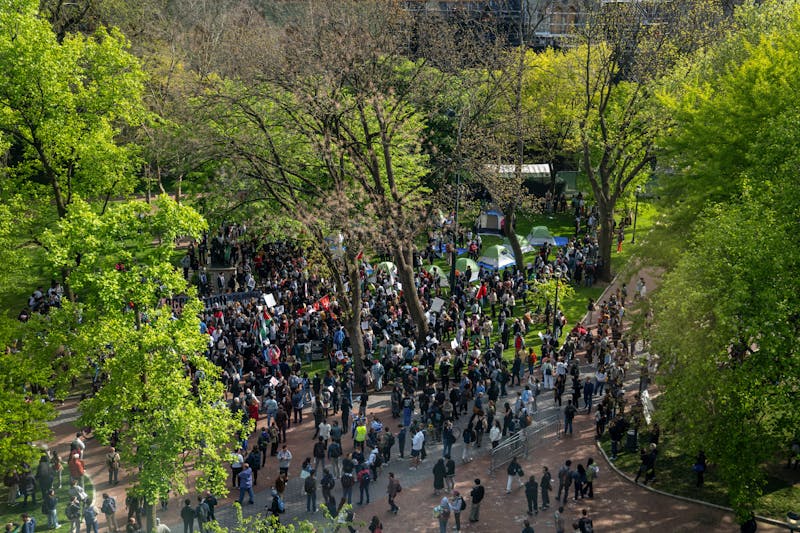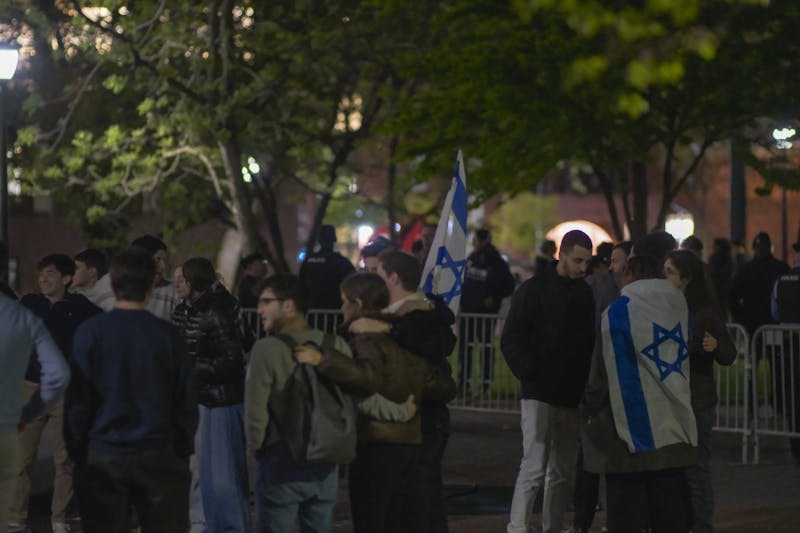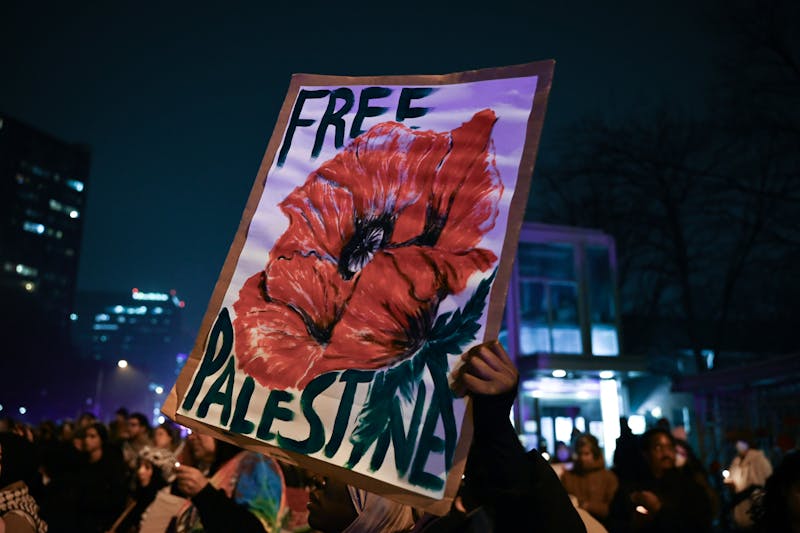
1965 Wharton graduate Ronald Lauder was among the high-profile donors who closed their checkbooks this past fall in reaction to the Palestine Writes Literature Festival.
Credit: Ethan YoungSeveral prominent Penn donors and alumni have expressed discontent with the University's response to the Gaza Solidarity Encampment and protests on campus.
The encampment — and Penn administrators’ response to it — prompted further scrutiny of the administration after several alumni withdrew financial support from the University last fall. After the clearing of the encampment, several alumni voiced frustrations and concerns with Penn's response to antisemitism and the University's future direction to The Daily Pennsylvanian.
1984 College graduate David Dormont, a self-proclaimed “Progressive Zionist,” acknowledged students’ right to protest the ongoing Israel-Hamas war but criticized their language, describing it as “divisive” and “misinformed.”
“As someone who has been to Israel, I have seen the actual damage and harm done to the people there,” Dormont told the DP.
1960 and 1961 Engineering graduate Melvyn Miller told the DP that if Penn “continues to be the laughingstock of the world, the degree will not be worth what it once was.”
He expressed dissatisfaction over the symbolism of protest actions on campus and their potential impact on the University's direction and how it cares for its students.
“It is just an indication that Penn will not allow students to devote the study hours necessary to get a degree from an elite university,” he said.
Miller previously described the encampment as “counterproductive for the people who were doing it and for the University" and criticized some faculty members for prioritizing “fairly poorly defined philosophical constructs, such as academic freedom and freedom of speech” over Penn’s federal funding.
1972 College graduate Jeffrey Rothbard also expressed concern with the encampment and Penn's response to it.
“Like most Jewish alumni, I was outraged,” he told the DP. “Of course, my idea is to support Penn in the good times and the bad times. However, the encampment, I found, was incredibly offensive.”
On May 10, Penn Police officers in riot gear, with the assistance of Philadelphia Police, arrested 33 individuals — including nine Penn students — at Penn’s Gaza Solidarity Encampment.
The arrests came 16 days after pro-Palestinian activists pitched approximately 40 tents on College Green in protest of the University's response to the war in Gaza. The group demanded that Penn disclose its financial holdings; divest from corporations that benefit from the ongoing Israel-Hamas war, Israel’s occupation of Palestinian land, and Israeli institutions committing “scholasticide”; and defend Palestinian students and withdraw its disciplinary actions against pro-Palestinian activists.
Rothbard expressed disappointment in the University's delayed response to the encampment, adding that “as a Democrat, a lawyer, and someone with liberal ideas, I'm a firm believer in First Amendment rights, and I'm uncomfortable about them being abridged by anyone other than a judge.”
“However, in this situation, it was apparent that diplomacy was not going to work,” he said.
Rothbard also added that he felt members of the senior class were deprived of their final college experiences due to the protests.
“I was very, very upset by that,” he said.
Pro-Palestinian alumni have also expressed displeasure with the University's response to the encampment, with some pledging to withhold donations until Penn divests from Israel.
In an open letter to Interim Penn President Larry Jameson released on April 30, members of Penn Alumni for Palestine — a collective of alumni, parents, and students — pledged to stop donating money to Penn until their demands are met.
“We cannot stand idly by and watch these conditions persist any longer,” the group wrote, referencing the number of casualties since the Israel-Hamas war began and that the International Court of Justice “determined that there is a ‘real and imminent risk’ that Israel is committing genocide in Gaza” on Jan. 26.
“In the context of an ongoing genocide and an ethnic cleansing campaign, we urge the Penn community – alumni, parents, and current students – to support the call for divestment from Israel’s illegal occupation and widely recognized system of apartheid,” they wrote.
The group demanded that Penn issue a statement calling for a ceasefire in Gaza; “disassociate and divest” from all companies that “profit from or engage” in Israel’s military campaign; “disclose and terminate” any Penn research on war weapons funded by the Department of Defense — including Ghost Robotics; cease “academic or cultural association” with Israeli institutions and businesses; and protect students, faculty, and staff “who risk retaliatory threats to their employment and safety while exercising their right to criticize the state of Israel.”
“Until our demands are met, we pledge to withhold any and all donations to Penn,” the letter read.
The letter has collected nearly 800 signatures.
Dormont added that much of his discontent with the University stemmed from former Penn President Liz Magill's handling of the Palestine Writes Literature Festival, which took place on Penn's campus in September. The festival welcomed Palestinian writers and performers to campus to celebrate Palestinian art and culture, as well as several speakers, including Pink Floyd co-founder Roger Waters. Waters, along with other speakers, faced local and national backlash over previous remarks that have been labeled as antisemitic ahead of his appearance at the festival.
“I do not understand why the University had to invite a known antisemite and not actual Palestinian people,” Dormont said.
The festival — and Penn's response to it — sparked controversy across campus and nationally, including from Philadelphia's Jewish community. Magill, Provost John Jackson Jr., and School of Arts and Sciences Dean Steven Fluharty received two letters representing differing perspectives of the controversy. One — signed by 200 members of the Philadelphia community, including 69 Penn affiliates — called for the administration to “emphasize that Palestinian activism has no inherent relation with antisemitism” and “protect the safety of Festival attendees.”
The other, sent by 2024 College graduate Eyal Yakoby and signed by more than 200 anonymous members of the Penn community, condemned seven speakers at the festival for antisemitism and asserted that their presence led to a “hostile” experience for Jewish students, "regardless of their course of study.”
In October, Magill said that the University could have been more forceful in communicating its view on the festival and distanced Penn from festival speakers who, she wrote, had a “public history of speaking out viciously against the Jewish people.”
“The University did not, and emphatically does not, endorse these speakers or their views,” Magill wrote. “While we did communicate, we should have moved faster to share our position strongly and more broadly with the Penn community.”
In the wake of the festival and the surrounding controversy, several high-profile donors and alumni — including 1967 College graduate Stephen Levin and 1987 College graduate Jon Huntsman Jr. and his family — halted donations to the University, blaming the administration's response to antisemitism since the start of the Israel-Hamas war.
The Daily Pennsylvanian is an independent, student-run newspaper. Please consider making a donation to support the coverage that shapes the University. Your generosity ensures a future of strong journalism at Penn.
Donate








